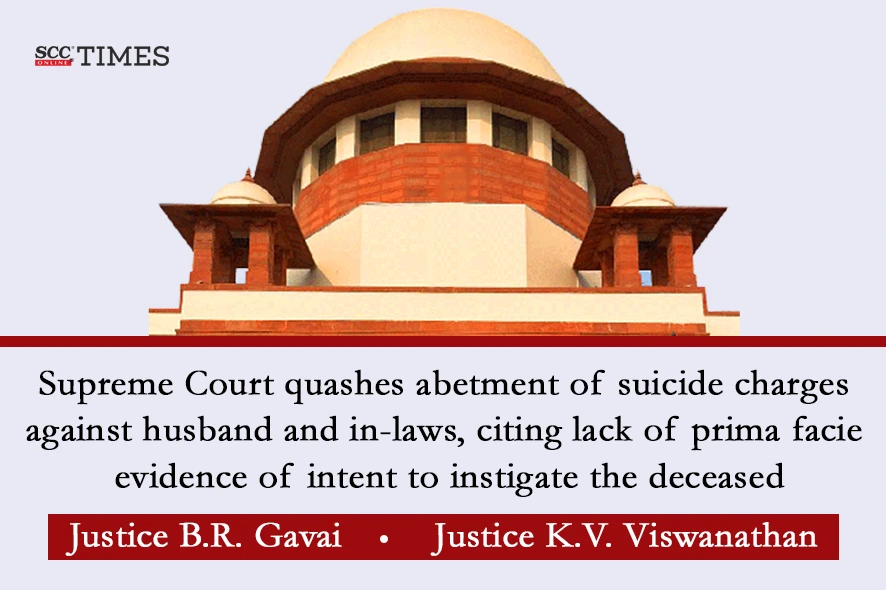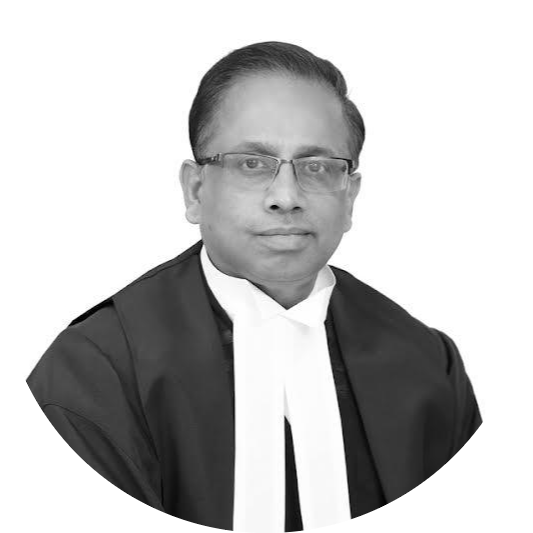Supreme Court: In an appeal filed against judgment and order passed by Bombay High Court, by which the Single Judge dismissed the writ petition praying to quash the order passed by Assistant Sessions Judge, wherein the Judge had rejected to discharge the accused persons from the charges punishable under Sections 306 and 34 of the Penal Code, 1860, (‘IPC’), the division bench of BR Gavai* and KV Viswanathan, JJ. set aside the impugned judgment and order of the Bombay High Court and the order of the Assistant Sessions Judge, thereby discharging the accused persons.
Background
The case revolves around the tragic suicide of the deceased on 20-03-2015, who had been experiencing ongoing abuse and marital disputes. Her mother lodged a complaint, alleging that she had been physically and mentally tortured by her husband and his family. Despite a criminal case under the Protection of Women from Domestic Violence Act, 2005, and an unsuccessful attempt at reconciliation in a Mahalokadalat on 17-02-2015, her in-laws reportedly told her that she would not be allowed back into her matrimonial home, leading her to express suicidal thoughts. On 20-03-2015, the deceased hanged herself, and her family filed an FIR under Section 306 (abetment of suicide) and Section 34 (common intention) of the Penal Code against her husband and in-laws. After the chargesheet was filed, the accused persons sought discharge from the case, but the Trial Court rejected their plea, finding sufficient grounds to proceed. The accused persons subsequent writ petition before the High Court was dismissed, prompting them to file this appeal.
Analysis and Decision
The Court took note of the relevant provisions of the IPC and observed that to sustain a charge under Section 306 of the IPC, it must necessarily be proved that the accused person has contributed to the suicide by the deceased by some direct or indirect act. To prove such contribution or involvement, one of the three conditions outlined in Section 107 of the IPC has to be satisfied.
The Court reiterated that abetment involves a mental process of instigating or intentionally aiding another person to do a particular thing. To bring a charge under Section 306 of the IPC, the act of abetment would require the positive act of instigating or intentionally aiding another person to commit suicide. Without such mens rea on the part of the accused person being apparent from the face of the record, a charge under the aforesaid Section cannot be sustained. Abetment also requires an active act, direct or indirect, on the part of the accused person which left the deceased with no other option but to commit suicide. Therefore, a positive act of instigation is a crucial element of abetment.
The Court highlighted that instigation or incitement on the part of the accused person is the gravamen of the offence of abetment of suicide. However, to link the act of instigation to the act of suicide, the two occurrences must be in close proximity to each other to form a nexus or a chain, with the act of suicide by the deceased being a direct result of the act of instigation by the accused person.
The Court noted that in the case at hand, taking the allegations in the FIR at face value, the incident at the mahalokadalat had occurred on 17-02-2015, while the deceased had committed suicide on 20-03-2015. There is a clear gap of over a month between the incident at the mahalokadalat and the commission of suicide. Therefore, the Court concluded that the courts below have erroneously accepted the prosecution story that the act of suicide by the deceased was a direct result of the words uttered by the accused persons at the Mahalokadalat.
The Court emphasised that the cardinal principle of the subject matter at hand is that there must be a close proximity between the positive act of instigation by the accused person and the commission of suicide by the victim. The close proximity should be such as to create a clear nexus between the act of instigation and the act of suicide.
Perusing the Accidental Death Report lodged on the day of the incident by the deceased’s brother, the Court noted that there is no mention about any involvement of the accused persons in the suicidal death of the deceased. Further, there is no mention about the incident that had occurred at the Mahalokadalat which had put the deceased in a state of depression such that she frequently spoke about committing suicide. These facts are alleged for the first time in the FIR which was lodged five days after the incident.
The Court found that the High Court’s reasoning for refusing to discharge the accused persons was perfunctory and lacked thorough consideration. While the High Court noted that there was no direct allegation of harassment or cruelty against the accused in the Accidental Death Report, it nonetheless concluded that the FIR allegations could not be disregarded. The High Court also acknowledged the discrepancy regarding the date of the Mahalokadalat in the FIR but deemed it not sufficient to discharge the accused persons, considering the emotional state of the complainant, the deceased’s mother.
However, the Court observed that the prosecution had failed to prima facie establish that the accused persons had any intent to instigate, aid, or abet the deceased in committing suicide. While recognizing the tragic loss of a young woman’s life, the Court emphasized that there was insufficient material to demonstrate that the accused persons’ actions or words had pushed the deceased to such an extent that she felt suicide was her only option. In the absence of such evidence, continuing the criminal proceedings would amount to an abuse of process, and thus, the Court decided to allow the appeal, quashing the charges against the accused persons.
CASE DETAILS
|
Citation: Appellants : Respondents : |
Advocates who appeared in this case For Petitioner(s): For Respondent(s): |
CORAM :









